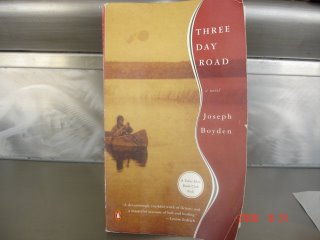Three Day Road ****
 Three Day Road by Joseph Boyden
Three Day Road by Joseph BoydenThree day road is a reference to the time period between the time of death and the arrival at another place.
I normally would not choose to read a war novel. This book captured me. It is an amazingly soft and sensitive recount of the deplorable horrors of WWI as experienced by two aboriginal Canadian soldiers. The magic of the novel is amplified by the tapestry of three simultaneous narratives woven together with colorful threads of linguistic talent. The foundation of the drama is built around the return of Xavier Bird, now an amputee and morphine addict. He is met by his aunt, Niska an Oji-Cree medicine woman, and with seamless transitions her own personal history unfolds as she struggles to salvage him from the internal demons that are ravaging his body, his mind and his soul.
Superimposed on these two stories are the dramatic descriptions of Xavier and his friend, Elijah Whiskeyjack, in combat displaying versatility in utilizing the experiences and skills they developed in their upbringing in the isolated world of primordial survival in the far northern regions of Ontario in the early 20th century.
There is a magnetic realism in the purity of the spirituality of indigenous cultures. With defined believability the saving and healing power of mysticism defies rationality but defines the logic of “holiness” in a dimension that differs from the transparency of our western cultures.
There is not a lot of happiness in this book. There is not a lot of joy. There is a disturbing amount of reality in this book. There is cannibalism. There is mystic healing. There is friendship. There is tragedy. There is triumph. There is a volcanic social conscience that erupts in unexpected arenas. There is hope. There is potential salvation. There is a very good novel.


0 Comments:
Post a Comment
<< Home